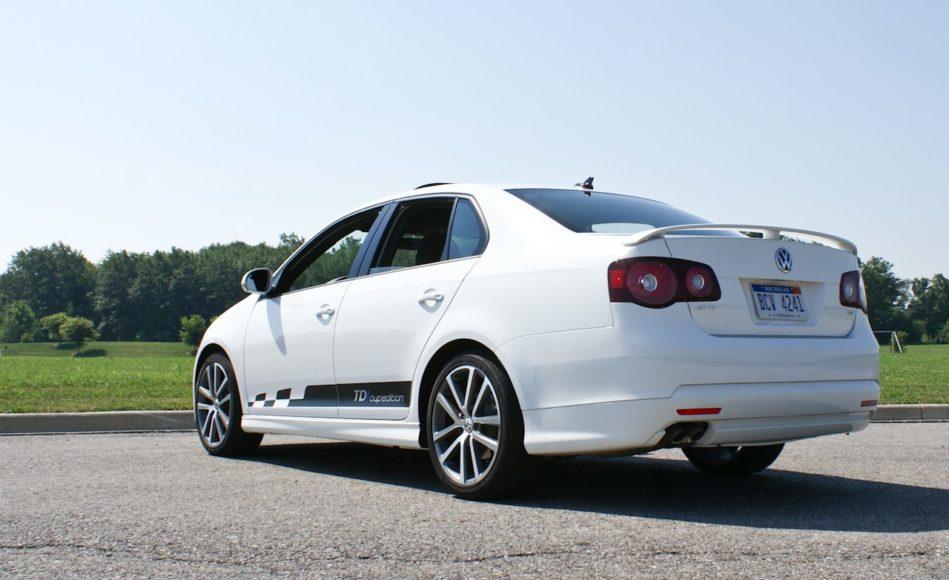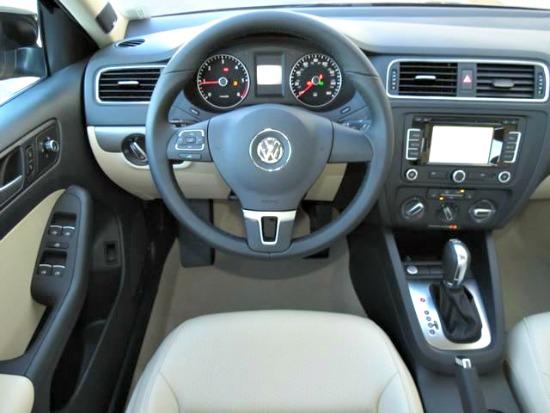Volkswagen is an old hand at selling diesel-engine cars in America, having offered them in the 1970s and 1980s. Many VW auto diesel owners loved them, although the automaker’s latest diesel is far advanced from the old ones.
Volkswagen has made its top-selling Jetta sleeker, larger, roomier, quieter and more refined for 2011, and the automaker’s four-cylinder turbodiesel engine makes the 2014 Jetta TDI model especially attractive.
Auto diesel engines long have been popular in Europe, partly because of extra-stiff fuel prices. I easily cruised at 100 m.p.h. on a high-speed German autobahn during the media introduction of the 2010 Volkswagen Golf with no apprehension about running out of fuel despite driving long distances.

Chevrolet now even offers its small 2014 Cruze sedan with a turbocharged four-cylinder diesel and says diesel fuel is currently available at more than half the fuel stations in the United States. Jetta TDI buyers should make sure they know where these stations are located.
The front-drive, compact-size Jetta sedan has had incremental improvements since 2011 and was Volkswagen’s top seller in America in 2013. For 2014, it’s virtually unchanged, although the current sedan has a new independent rear suspension for better ride and handling.
My test Jetta TDI had the 2-liter turbodiesel, which generates 140 horsepower and a significant 246 pound/feet of torque. That torque gives the car lively in-town acceleration. Merging into fast freeway traffic and passing on freeways and highways presented no problems.
Forget about the old diesel noise, loud clatter and smell—that’s all gone. I could barely hear the Jetta diesel’s ticking sound when standing near the hood when the low-emission engine was idling.
Cold-weather starts were virtually instant, although temperatures were hovering near zero during the week I had the car. You had to wait 30 seconds or so before starting old-generation diesels in such frigid weather.
Besides a long life, diesels are known for excellent fuel economy, and my test car’s fuel gauge only reluctantly began to move from its “full” spot after several days of moderate city/freeway driving. Estimated fuel economy was 30 miles per gallon in the city and 42 on highways with the car’s six-speed manual transmission Figures with a six-speed DSG automatic are nearly identical. In any case, Volkswagen may be underrating the diesel’s economy numbers.

With the manual, a downshift from sixth to fourth or, preferably, third gear is needed for quick 65-75 m.p.h. vehicle passing on highways. Fifth is OK if you just want a lazy pass, but sixth is strictly a cruising gear that puts the engine at a very low r.p.m. level. Stay in third gear in town for quick moves—fifth and sixth at 30 m.p.h. cause the engine to lug.
The unusually long clutch throw—also experienced with BMWs—was rather annoying because it made me stall the engine several times at stop signs. But the clutch has a light action, and the short-throw shifter works so well that changing gears is a virtually thoughtless procedure if you’re familiar with stick shifts. The DSG automatic is a good choice if you dislike shifting. While it works automatically, it has much of the efficiency of a manual.
Jettas with gasoline engines can be had at lower prices because diesel cars cost more. My test Jetta TDI listed at $23,195, without an $820 freight charge. It looked slick, was roomy and quiet, and handled almost as adroitly as some sports sedans.
The supple suspension easily handled road imperfections while providing a good ride. While on the firm side, the ride, oddly, became a bit “floaty” on uneven tollway surfaces.
The solid-feeling Jetta’s small, thick, easily gripped steering wheel almost seemed as if pulled from a Formula Junior race car. Steering effort was a little heavy, but the steering was nicely weighted, with a fair amount of road feel. The brake pedal had a linear action for easy stops with the anti-lock all-disc brakes.
Volkswagen would like its diesel models to attract more Americans, so it’s given the Jetta TDI a good number of standard features. My test car’s features included a six-speaker sound system, heated and leather-covered front seats, air conditioning, cruise control, adjustable steering wheel, adjustable front center armrest and power windows, heated power mirrors with turn signals and locks with a remote locking system.
Safety items included the usual front air bags, front and rear side-curtain head protection air bags, electronic stability control, electronic differential lock and a tire pressure monitoring system. Many cars don’t steer, handle or brake properly because they have improperly inflated tires.
Only a discreet “TDI” trunk insignia lets the world know the Jetta TDI is a diesel. The quiet, roomy interior looks upscale and businesslike, in the typical German car tradition. Front seats are supportive, but the driver’s seat is only manually adjustable. Rear seats have a hard center area best left to the fold-down armrest, which contains dual cupholders.
The cabin has a large raised spot for a driver’s left foot for more comfort when covering long distances.
It also has a decent amount of storage areas, including a covered center storage bin. The visor vanity mirrors are illuminated. Rotary climate controls are easy to use, but audio controls take getting used to.
After awhile, putting the ignition key in its awkwardly located slot behind the wheel made me wish the car had a pushbutton start.
The roomy trunk has manual hinges instead of hydraulic struts, but can be remotely opened with the ignition key fob. The trunk lid’s edge has two deep interior indented areas that facilitate closing the lid, but the heavy hood is held open with just a prop rod.
The split 60/40 rear seatbacks have trunk-mounted releases and can be flipped forward to significantly enlarge the cargo area. However, the “60” part of the split seat refused to budge despite my best efforts.
The Jetta is generally nifty with any engine, but the diesel seems particularly suited to it.
Pros: Slick. Refined turbodiesel. Fuel-sipper. Fairly quick. Agile. Comfy.
Cons: Manual needs downshifting for quick passing. Costs more than gas-engine Jetta. Must find diesel fuel stations.
Bottom Line: Jetta model with diesel is an attractive combination.
Dan Jedlicka has been an automotive journalist for more than 40 years. To read more of his new and vintage car reviews, visit: www.danjedlicka.com.
Article Last Updated: April 22, 2014.